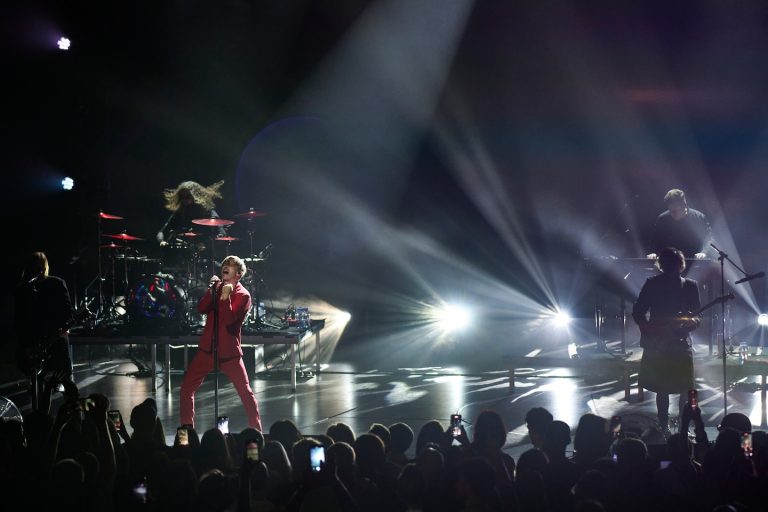Seven members of Bi-2 were arrested in Thailand last week after a show on the island of Phuket, where authorities cited permit issues.
The band said in a statement that it had always held concerts “in accordance with local laws and practices,” adding that the local show organizer had incorrectly filled out paperwork, a minor offense for which they were each fined about $84 and paid on the spot. .
But after the hearing, Thai immigration police arrested the band members and took them to Bangkok, where authorities are expected to issue a deportation order.
“No additional charges have been brought against us,” the band’s representatives said in a message shared on VKontakte, Russia’s version of Facebook. “The situation and the hype surrounding it indicate that external pressure played an important role in our arrest. We know that the causes of this pressure are our creativity, our views, and our attitude.”
Opposition politician Dmitry Gudkov, who has been in contact with the band, said Russian authorities were putting pressure on their Thai counterparts to deport the musicians to Russia.
“With all the procedural violations… it has become clear that this process is controlled from Moscow,” Russian music producer and journalist Mikhail Kozyrev said in an interview with the independent Russian-language channel TV Rain. “This is a clear act of retaliation to rebuke all artists who choose not to support the war. The message here is: We will find you and get you wherever you are.”
Russian Consul General in Phuket, Vladimir Sosnov, told Russian state news agency RIA Novosti that consular officials were not involved in the deportation.
According to Sosnov, five of the seven band members hold Russian passports, while one entered Thailand with an Israeli passport and the other with an Australian passport. The agency added: “According to local laws, deportation takes place by direct flight to the country where the passport was issued.”
Maria Zakharova, a spokeswoman for the Russian Foreign Ministry, said she was not surprised that anti-war artists were facing problems while touring abroad, and sought to link this to Ukrainian President Volodymyr Zelensky.
“No one wants the problems that can arise with people who sponsor terrorism,” she told Budim media. “The terrorist attacks committed by Gillian Zelenskyy terrify the whole world.”
There is no known legal case against Bi-2 members in Russia, so Moscow had no basis to seek their extradition. But Bi-2 supporters fear that if they are extradited to Russia, they could face criminal charges stemming from their past anti-war statements.
For Thailand, the issue is diplomatically complex. Many of the band members are Israeli-Russian citizens, allowing them to compete for a destination country if they are deported. The other two members of the squad are not Russian citizens, according to the Bi-2 statement, and cannot be deported to Russia.
Bi-2, whose founding members hail from Belarus, is one of the most successful Russian-language rock bands since the end of the Soviet Union. In 2022, its members refused to perform at a venue decorated with a pro-war, pro-Putin banner. Their concerts in Russia were eventually cancelled, and the band went into self-imposed exile.
“I will not return to Russia,” lead singer Igor Bortnik, who uses the stage name Lyova, wrote in a comment on his Instagram page last year. “The only thing Putin's Russia inspires now is disgust.”
The major artists who remained in Russia after the February 2022 invasion had no choice but to follow the unspoken rule of supporting the war, or at least not discussing it. Those who left the country lost recording deals, studios and part of their audience, but were free to continue speaking out against the war. Many found that their businesses could flourish abroad even without Russian venues or found new audiences of like-minded Russians who had also fled.
But recently, some concerts have been banned in countries that have emerged as centers for the Russian diaspora, raising concerns that Moscow is pressuring governments to boycott dissident artists.
Prior to the B-2 arrests, Thailand canceled the performances of two Russian anti-war artists, comedians Ruslan Bely and Maxim Galkin, both of whom were classified by the Russian government as “foreign agents,” a label used to target many opposition politicians. Artists, journalists and activists.
Galkin, who often criticizes the Russian authorities and the war in Ukraine in his monologues, was recently banned from entering Indonesia, where he was planning to perform.
“The reason was given almost immediately and repeated several times by various border service employees – a letter from the Russian government requesting that I not be allowed into Bali,” Galkin wrote on his Instagram page.
Galkin and other artists also said that organizers in Dubai had asked Russian artists to tone down any pro-Ukraine rhetoric.

